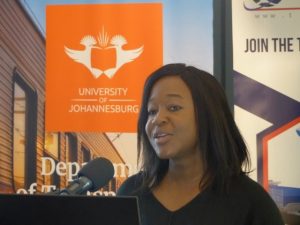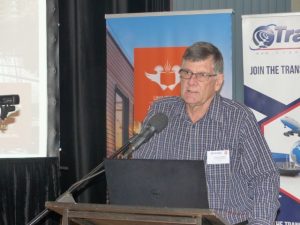Departmental Information
Home » College of Business and Economics » Schools » School of Management » Departments » Department of Transport and Supply Chain Management »TSCM students shine at the 2023 UJ Sports Awards

Congratulations to our exceptional athletes for their outstanding achievements at the 2023 UJ Sports Awards!
Tsebo Matsoso, Joviale Mbisha, Ryan Mphahlele, and Owethu Ngubane, we are incredibly proud of your accomplishments.
Read more:
The Annual TSCM Student Awards 2024

DTSCM Flashback Newsletter
Time to Rethink Commuter Rail Strategy
By Dr Ismail Vadi and Prof Jackie Walters
https://www.dailymaverick.co.za/article/2020-10-21-time-to-rethink-commuter-rail-strategy/
Selection of Speeches by Dr Ismail Vadi
Selection of speeches by Dr Ismail Vadi
Should you wish to correspond with Dr Ismail Vadi, regarding the above publication.
Kindly do so via: ivadi@telkomsa.net
Journal of Transport and Supply Chain Management
The current version can be viewed in full at: http://jtscm.co.za/index.php/jtscm
The Journal of Transport and Supply Chain Management is now on Twitter.
Find us on Twitter with the handle @JTSCM_Journal.
Alternatively, click here: https://twitter.com/JTSCM_Journal
College of Business and Economics (CBE) 2023 Annual Report
Partnership with Glasgow Caledonian University and Transnet Freight Rail
Transnet Freight Rail (TFR) identified a major training gap in rail operations in the organisation. In an alliance between TFR, the Glasgow Caledonian University (GCU), UJ and the Institute of Rail Operators in Britain, a course was identified to address these needs through certificate, diploma and degree programmes. The Department of Transport and Supply Chain Management has been involved in this course from a development, managerial and presentation perspective. The first intake of students (TFR employees) started in April 2012. The success of this venture developed into an extension of the contract between UJ and Transnet with intakes of students in 2013, 2014 and 2015. A further extension was agreed upon in August 2017, resulting in an additional five cohorts of students registering in 2017, 2018, 2019, 2020 and 2021.This extension also incorporated the offering of a Honour’s and Master’s Degree.
The Transport Education and Training Authority 4IR Research Chair
The Transport Education and Training Authority 4IR research chair is housed in the department. The research chair has enabled us to stay at the forefront of industry advancements which include the development and offering of the Drone Applications in 4IR and the Green Transport short learning programmes.
The research chair activities also include bursaries for full time Masters and PhD students, and two research projects.
Transport Forum
Transport Forum hosted by the University of Johannesburg’s Department of Transport and Supply Chain Management
Seventeen years ago, the Transport Forum was created as part of the state-owned arivia.kom’s drive to enhance the group’s growth strategy in the transport sector. With the acquisition of arivia.kom in 2010, T-Systems South Africa (Pty) Ltd became the proud Platinum Sponsor of the Transport Forum. Close cooperation with content providers such as recognised industry bodies, universities, regulatory bodies, consulting houses, NGOs and numerous role players from the private and public transport sectors resulted in this initiative expanding to play a significant role in networking and content provision to decision makers.
The Transport Forum became an enabler and mobiliser in the transport sector with the aim of streamlining interaction and cooperation amongst the role players. Attendance at the monthly special interest group (SIG) sessions is mostly free of charge to reduce red tape and accommodate budget constraints for participants. Networking at these sessions often result in alliances which contribute towards making a difference in the transport industry in South Africa.
The Transport Forum’s website: http://www.transportsig.com, offers registered users (free of charge) the opportunity to network with other registered users and to download presentations presented at the SIG sessions. The Transport Forum brings all role-players together cultivating the transport community of South Africa.



The Africa Transport Policy Program (SSATP) to lead the establishment of a research network of African universities
The initiative aimed at promoting evidence-based transport policies and strategies in Africa. In other words, the goal is to support research changes and development impact.
Africa is facing three urgent transport challenges: (i) the continent has the highest rate of road fatalities in the world; (ii) it has an unprecedented growth rate of urbanization; and (iii) it has the highest transport costs in the world. Over the next 25 years, an additional 500 million people will live in African cities, yet many of these cities are ill-equipped to provide safe, reliable and sustainable transport for all. The time has come to address these challenges and search for solutions through knowledge sharing and research findings in the African transport sector.
The Africa Transport Policy Program (SSATP), an international partnership who aims to facilitate policy development and related capacity-building in the transport sector in Africa, hosted by the World Bank Group, has taken the lead for the establishment of a research network of African universities, in association with the World Conference on Transport Research Society (WCTRS) and the World Research Institute (WRI), to address the above challenges and unleash the transport research potential within these institutions.
This initiative was launched on January 12th, 2018 during the session “Promoting Research and the African Universities Network” at the Transforming Transportation Forum in Washington, DC. A letter of intent was signed by officials of the World Bank, the World Research Institute (WRI), the World Conference on Transport Research Society (WCTRS), the University of Nairobi (UoN), the University of Dar es Salam (UoDS), the University of Johannesburg (UoJ), the University of Dakar (UCAD), and the Institut National Polytechnique de Yamoussoukro (INP HB). All the parties involved will sign the Memorandum of Understanding (MoU) before end of June 2018 that would provide the ground for developing cooperative research activities (joint research, exchange and joint training programs) in the African transport sector to further develop the research potential of African universities and strengthen institutional capacity on a continental level.
This cooperation agreement will offer a unique chance for the creation, development and centralization of transport research on the African continent. This platform will undoubtedly provide support for African countries to develop sound policies and strategies that will lead to efficient, safe and sustainable transport for the people in Africa.
SSATP is an international partnership of over 40 African countries, Regional Economic Communities, continental institutions (African Union Commission), U.N. agencies (United Nations Economic Commission for Africa), public and private sector organizations, and international development agencies and organizations. SSATP is funded by European Commission, French development Agency, African Development bank and Swiss Secretariat of Economic Cooperation and hosted by the World Bank’s Transport and ICT Global Practice. For more information on the SSATP, please visit our website in English and in French at www.ssatp.org
